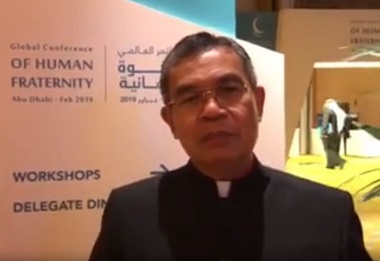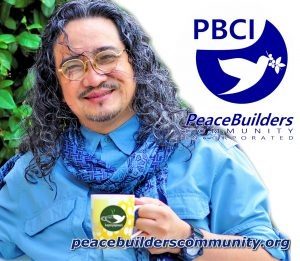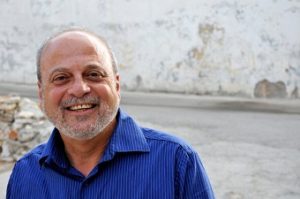
Bishop Efraim Tendero, leader of the World Evangelical Alliance, spoke at the Global Conference on Human Fraternity in Abu Dhabi.
Pope Francis received a lot of attention when he took part in the Global Conference on Human Fraternity February 3 – 4 in Abu Dhabi, United Arab Emirates (UAE).
As a helpful Christianity Today article put it:
Pope Francis must love creating cognitive dissonance. This week, he became the first Catholic pontiff to ever visit the Arabian Peninsula, the heart of Islam, where conversion to Christianity is illegal. . . Attendance [at an outdoor mass] reached 135,000, billed as the largest Christian gathering ever held in the Arabian Peninsula.
Much less publicized was participation by the Secretary General of the World Evangelical Alliance (WEA), Bishop Efraim Tendero. He made four points which I think would be of particular interest to local Christians during his powerful peace-oriented address to the large interfaith gathering:
- He described the ‘peace building’ work of his old friend Dann Pantoja (who pastored and studied in Vancouver for about 20 years) in a Muslim-dominated part of the Philippines. Tendero spoke of the “powerful contribution to global peace” that Christians could make as those who are called by Jesus Christ to be peace builders.
- He also pointed to the unique reconciling work of Palestinian Israeli Christian Salim Munayer, who was a keynote speaker at Missions Fest earlier this month.
- He demonstrated very clearly – without stating it in so many words – that evangelicalism is no longer an American phenomenon; it is a major worldwide movement.
- He concluded by “gently suggesting” that “forced religious belief is no belief at all.”
Following is the text of Bishop Tendero’s address, which is re-posted by permission.
All thanks and praise to God. Thank you for inviting me to participate in this great conference. More importantly, I want to thank you for holding this event. Your effort to bring together the world’s religious leaders is in itself an important gesture and a significant step toward building peace and fraternity.
As Secretary General of the World Evangelical Alliance, I greet you on behalf of the world’s 600 million evangelicals. Our numbers range from large percentages of the population in many African, Caribbean and Latin American nations to small but visible minorities in most Middle Eastern countries. Unlike the Catholics, we do not have a pope, but the World Evangelical Alliance is broadly recognized as a voice for evangelicals at the global level.
Global peace builders
Before becoming Secretary General of the WEA, I led the evangelical alliance in the Philippines for 22 years. In that role, I was deeply involved in building peace between Christians and Muslims. What we did in the Philippines can happen elsewhere. I will draw on my experience there to illustrate my points today.
Christians can and should make a powerful contribution to global peace, because we are (1) followers of Jesus, (2) believers in the inspiration of the Hebrew and Christian scriptures, and (3) called to be peace builders. I will briefly explain each point.
1. Being followers of Jesus, we are called to obey his teachings about loving God and loving our neighbours as ourselves. This love is unselfish and sacrificial; it compels us to serve others above ourselves.
Jesus said that we should love not only those people who are like us (that is, people of the same race, language or religious affiliation whom we very easily call our brothers), but also those who are not like us. He commanded us to extend the same quality of love even to people who might view us as their enemies. His ultimate expression of that love was to submit to being hung on a cross, crucified there by his enemies. While suffering the horrific pain inflicted by his foes, with his dying breaths Jesus said, “Father, forgive them, for they know not what they do.”
He called us, in the same way, to give ourselves for others. This model of giving one’s life in the service of our fellow human beings is the most powerful way to counter divisiveness, hatred and violence. Jesus’ model, though radical in itself, is the antidote to extremism.
As an evangelical leader in the Philippines, I determined to apply this example. During a public prayer rally for peace in the Philippines, I invited a Muslim sultan onto the stage and asked his forgiveness, on behalf of evangelicals, for our prejudice and negative attitudes toward Muslims. He granted forgiveness and we became friends. That exchange initiated our joint advocacy for peace in the land.
Later, when my peace-building efforts took me to Jolo in the province of Sulu – an area of the Philippines with a large number of Muslim rebels – people worried that I might be putting my life in danger. But this Muslim sultan accompanied me on my travels. He told me, “As long as you are with me, you will have no trouble here.”
2. Second, followers of Jesus subscribe to the teaching of the Bible, which says that God
created humankind in his own image.
Although that image of God has been marred by sin, it has not been eradicated. We still bear the image of God. Therefore, the Bible places a very high premium on the value of every human being. In the Hebrew scriptures, or what Christians call the Old Testament, we read of God’s very high regard for humanity, as beautifully expressed in Psalm 8:
When I look at your heavens, the work of your fingers, the moon and the stars, which you have set in place, what is man that you are mindful of him, and the son of man that you care for him? Yet you have made him a little lower than the heavenly beings and crowned him with glory and honour. You have given him dominion over the works of your hands; you have put all things under his feet.
Dann Pantoja

Dann Pantoja lived in Vancouver for many years, but now works with Muslims in the Philippines.
As an example of how this message impacts Christians who take it seriously, consider Rev. Dann Pantoja, my roommate in Bible school. He eventually migrated to Canada and worked in Christian missions, but the ongoing civil conflicts on the Philippine island of Mindanao tugged at his heart.
Finally, Dann decided to immerse himself in Mindanao and lived with Muslims for six months. He received such a warm welcome that he relocated his family from Canada to Mindanao. Dann and his family have been living there for 10 years now, leading the Peacebuilders Community, a ministry that actively engages in peace and reconciliation ministry.
One of the previous presidents of the Philippines had a policy of all-out war against the Muslim rebels. Under his rule, the military used its full force to capture the rebel camps, destroying the homes of many civilians in the process. In response, the evangelical churches raised funds and mobilized volunteers to rebuild the homes and even the local mosque.
The Muslim sultan welcomed the evangelicals and declared their area to be a zone of peace. These are actions that a Christian or Muslim community anywhere in the world could take without compromising their faith in any way. When we build bridges through such acts of kindness, any existing misunderstanding or hatred quickly disappears.
3. That leads to my third point: the Christian scriptures command us to be peace builders.
As Romans 14:19 says, “Let us pursue what makes for peace and for mutual upbuilding.” In 2008, I led a delegation of pastors and imams who visited the headquarters of the Moro Islamic Liberation Front (MILF) to encourage them to pursue peace. Our frank conversations with Muslim leaders persuaded them to enter into several years of negotiation with the Philippine government in crafting a comprehensive peace agreement that was signed in 2014.
Salim Munayer

Salim Munayer seeks reconciliation in Israel / Palestine.
In another hotly contested area of the world, Salim Munayer became academic dean of the Bethlehem, Israel Bible College in 1989. In the following year he started Musalaha, a nonprofit organization with the goal of facilitating reconciliation between Israelis and Palestinians, based on biblical principles.
For nearly 30 years, Musalaha has been arranging encounters and seminars at which Israelis and Palestinians get to know each other, while also gaining a better understanding of the longstanding conflict between the two groups and how people can become positive influences promoting peace and unity.
Here’s what one Israeli participant in Musalaha reconciliation programs said about her experience:
I really felt love there between the Israelis and the Palestinians. We discuss our situation, and we don’t agree with each other about everything. But that’s okay. It gives us the opportunity to be together and to be honest with one another. God wants us to find the common thing between each of us. Even though people are different, they are still our brothers and sisters. We have to be willing to be patient and kind and learn how to forgive.
Could we do this kind of thing all over the world? Of course we could, if prominent Christians and Muslims all over the world endorsed it. I propose that we implement a plan to create Centres for Friendship in communities where Muslims and Christians live side by side.
Establishing such communities does not require that we agree with the faith of the other, only that we know we need friendship with each other. We could start by having pastors and imams share time together to build friendships, then ask local people to open their homes and serve meals to mixed groups of Christian and Muslim participants. Structured events of this type could build relationships between people whose paths would not normally cross, creating channels for respectful relationships and community problem solving.
Or how about working together to organize a global conference for youth? Could a global movement of young Christians, Jews, Muslims, Buddhists, Hindus and other religions and worldviews working together for peace make it harder for extremist groups to radicalize youth? I think so.
Three simple acts
Finally, I would like to suggest three simple acts that should pervade our lives if we wish to make meaningful contributions to human fraternity. They are applicable to everyone, but particularly to those who occupy leadership positions.
The first act is active listening. Listen intently to the position of other people or groups. I am not just referring to your conversations. Listen carefully to what they are saying in their advertising, their media statements or their memes. Examine their stated positions to identify their underlying interests: what they hope for or fear, or what their source of security is. Behind those interests, look for their concrete needs, which could be for territory, liberty, safety or just assurance of food and shelter.
The second act is empathetic understanding. People’s statements always arise within a particular historical, cultural and/or linguistic context. To understand them, you need to understand this context, because the context plays a major role in shaping their attitudes, which in turn determine behaviour.
The third act is intentional collaboration. Your active listening and empathic understanding will equip you to enter sensitively into collaboration with others, because you have moved beyond the war of words to more deeply grasp their worldviews. Now you can pursue ways to work together based on a shared vision, mission and objectives. Having a well-defined, shared focus and purposes enables you and others to share financial resources, time, talent and trust.
Forced religious belief is no belief at all
We are experiencing perhaps the most intense round of confrontation and distrust between Christians and Muslims in 500 years or more. In parts of Europe and the United States, Islamophobia is rampant, fuelling the political success and policy agendas of regimes with nationalist tendencies. Conversely, in many parts of the Islamic world, Muslims are equally suspicious of Christians.
We all have an interest in ensuring that the people of our faith communities are treated respectfully and not exposed to mob attacks, persecution or any other threats to their human rights. That will happen if we learn to understand each other and talk with each other with kindness and respect.
There is enormous opportunity for global impact if we stand together in support of mutual respect and peaceful dialogue. Christians and Muslims can do that without compromising their beliefs, and in many parts of the world we have already done so. I would like to close by gently suggesting one other way in which I believe Christians could be a model in addressing extremism.
All over the world, evangelical Christians train their families in the hope that their children will also become followers of Jesus. Unfortunately, some do not. When that happens, we are deeply disappointed, but we continue to love them. We do not threaten, punish or attempt to harm them.
At earlier points in history, Christians have sometimes taken harder stances toward people who abandoned the Christian faith, but we have come to realize that forced religious belief is no belief at all.
God bless you!
